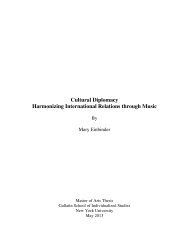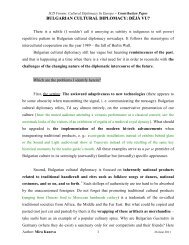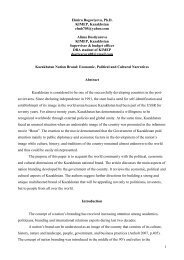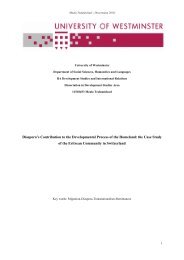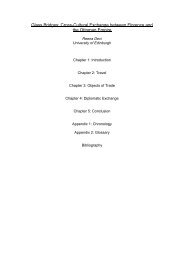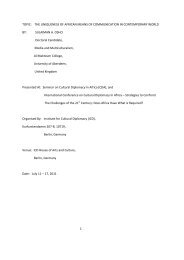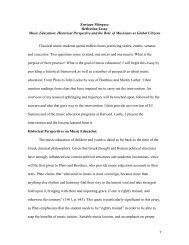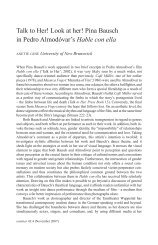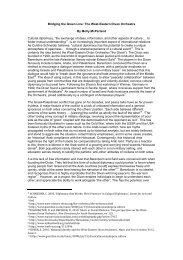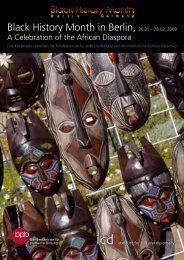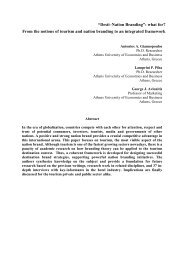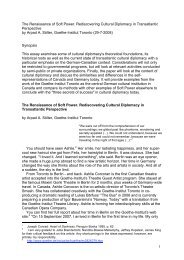Country Profiles: Germany - Institute for Cultural Diplomacy
Country Profiles: Germany - Institute for Cultural Diplomacy
Country Profiles: Germany - Institute for Cultural Diplomacy
You also want an ePaper? Increase the reach of your titles
YUMPU automatically turns print PDFs into web optimized ePapers that Google loves.
6.: Application of <strong>Cultural</strong> <strong>Diplomacy</strong> in the Public Sector<br />
In this part, the report will consider programmes and organisations of the public sector,<br />
meaning organisations or programmes initiated or currently directed by public institutions and<br />
offices.<br />
6.1 Deutscher Akademischer Austausch Dienst (German Academic Exchange<br />
Service)<br />
Agent of <strong>Cultural</strong> <strong>Diplomacy</strong>: DAAD<br />
Agenda: Further academic exchanges between <strong>Germany</strong> and other countries in the world<br />
Vehicle of <strong>Cultural</strong> <strong>Diplomacy</strong>: Different programmes to promote the internationalization of<br />
German Universities promote German studies and the German language abroad and assist<br />
developing countries in establishing effective universities<br />
Target Audience: Students and scientists open <strong>for</strong> international, academic exchange<br />
Since its establishment in 1925, the German Academic Exchange Service (DAAD) has<br />
granted scholarships and financial aid to over 1.5 million students and academics both in<br />
<strong>Germany</strong> and abroad, making this the largest funding organisation of its kind in the world.<br />
Not only does it provide grants and scholarships <strong>for</strong> academic exchanges abroad, but it is also<br />
involved in supporting the internationalisation of German universities, and working <strong>for</strong> the<br />
advancement of German studies and German language abroad. Furthermore, the DAAD<br />
offers assistance and expertise to developing countries in improving their own educational<br />
systems. The DAAD's budget is composed of funding from various German ministries and the<br />
European Union, as well as numerous enterprises, organisations, and <strong>for</strong>eign governments.<br />
The DAAD was founded in 1925 when a student organised scholarships <strong>for</strong> 13 German<br />
students in cooperation with the New York <strong>Institute</strong> of International Education. An exchange<br />
service was founded as a part of the University of Heidelberg be<strong>for</strong>e being moved to Berlin<br />
shortly after with the goal of supporting student and academic exchanges abroad. After<br />
closing <strong>for</strong> a period during World War II, the DAAD reopened in 1950 and soon expanded its<br />
work to include funding internships abroad. Since then, the work of the DAAD has<br />
continued to expand, covering more than 250 programmes today. These range from<br />
funding six-month study-abroad stays to supporting doctorate programmes abroad spanning<br />
several years. Each programme is open to students from all over the world, regardless of their<br />
country of origin or their field of study. The DAAD has gone from supporting 400 students in<br />
1950 to assisting nearly 60,000 students and academics in 2008. In addition to its central<br />
office in Bonn and its office in Berlin, the DAAD is represented on every continent in the<br />
world through 14 offices and 50 in<strong>for</strong>mation centers. 92<br />
One of the programmes that has been administered by the DAAD <strong>for</strong> the past <strong>for</strong>ty years is the<br />
Berlin Artists-in-Residence programme. Each year, this programme enables 20 artists in the<br />
areas of visual arts, literature, music, film, dance and per<strong>for</strong>mance to live in Berlin <strong>for</strong> one<br />
year. It is considered to be one of the world's most prestigious scholarships <strong>for</strong> artists. The<br />
programme's main goal is to encourage exchanges centred on art as well as on the<br />
involvement in cultural questions that are being discussed in other countries. It also aspires to<br />
further cultural and artistic diversity in Berlin. To meet these goals, the DAAD organizes



